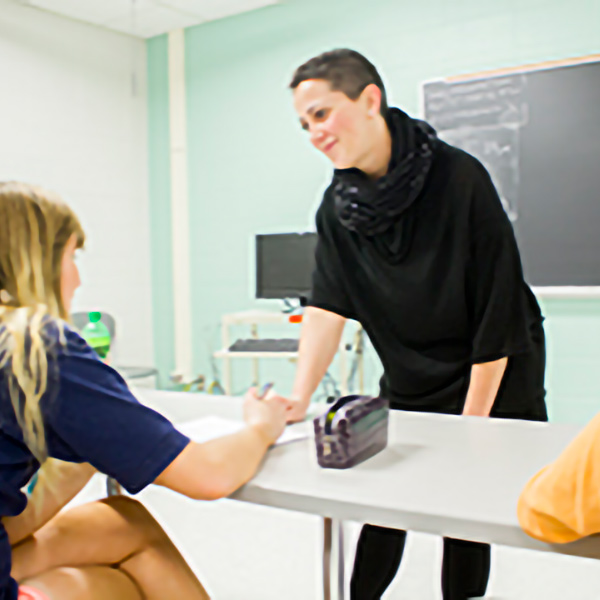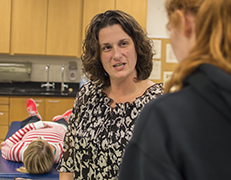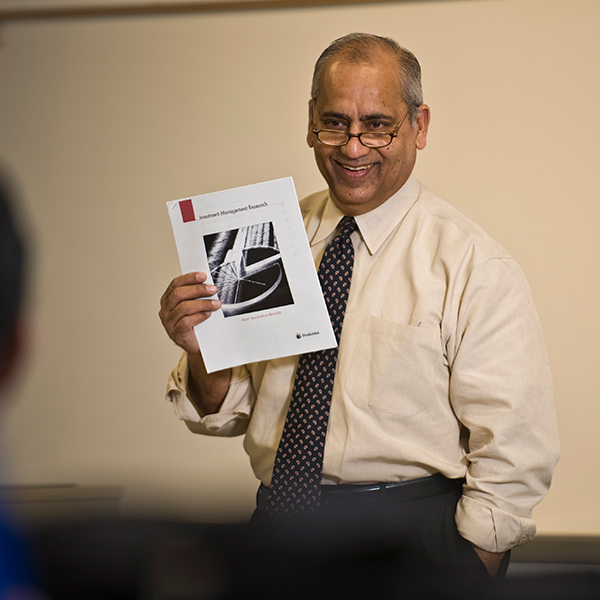Global Scholars 2014 - 2015
The Center for Innovation and Change at the University of Evansville announced that the following individuals were selected as 2014-2015 University of Evansville Global Scholars.
Each Global Scholar will receive a stipend and travel allowance. As Global Scholars, the recipients of this award will engage in scholarship, curriculum development, and activities related to preparing our students and community for global leadership, citizenry, and success. The Global Scholars program is supported by the John H. Schroeder Global Scholar Endowed Fund and the Lilly Endowment.
Dr. P. Lorena Andueza, Assistant Professor, Spanish

Dr. Andueza will study to what extent an immersion setting affects the process of learning Spanish as a second language. Specifically, she wants to show at what level of proficiency the study abroad experience is most effective (initial, intermediate, advanced), what skills the learners can improve upon the most (writing, speaking, reading listening), and determine the impact of the length of the study abroad experience (summer, semester, one year).
Dr. Andueza will compare the output of 15 students (American English native speakers) during their study abroad in a Spanish university (University of Deusto (Bilbao) or University of Antonio de Nebrija (Madrid)) at an initial, intermediate or advanced level that will spend 5/6 weeks, a semester abroad, or a year abroad using the target language in different tasks/exercises for which they will need to write, speak, listen and read (the tasks/ exercises provided to the students will be based on the content and the methodology of the courses). She will contact the teachers and read the syllabus before designing these tasks/exercises). In addition, 135 students will be interviewed one-on-one twice: upon arrival and just before departure. In those interviews, she will include questions about their motivations and purposes for studying Spanish, what kind of opportunities they had to interact with native speakers (comparing living conditions: homestay/dormitory, friends, internships…), their involvement in cultural and social activities and events, and will ask questions about their own perception of the learning process (what they think about the classes, the methodology, what they learn…) Factors of age, gender, their linguistic background (L1 and L3) will be considered as well. The control group will be students taking Spanish courses at UE at initial, intermediate and advanced level (45 students).
Her second goal is to conduct the same study with international students learning English and attending classes through the Intensive English learning center at UE. This will include the same factors and the same procedure used to evaluate the Study Abroad program in Spain (level of proficiency, length of the program, involvement in cultural events and in the community, etc.). The only difference will be that, since there are no students attending classes for just one summer or one semester but the entire year, 15 students per level will be interviewed.
Dr. Shala Cunningham, Assistant Professor, Physical Therapy

Dr. Cunningham will study the healthcare system in Kenya. It has been nationalized since 1970 with the Ministry of Health assuming responsibility for all public health facilities. With half of the population living in poverty, Kenya struggles to provide basic healthcare services to its citizens. The government published the Kenya Health Policy Framework Paper in 1994, which envisioned providing “quality health care that is acceptable, affordable, and accessible to all.” The framework led to decreases in infectious disease and improvement of child health. One of the main limitations for the delivery of healthcare is the shortage of qualified healthcare professionals in the region. The providers that are available tend to be localized in urban areas. This results in persistent human resource shortages in rural health facilities, in terms of both the numbers and qualifications of health workers. In addition to the difficulty in providing nationalized healthcare with a shortage of trained providers, Kenya enacted a new Constitution in 2010 decentralizing the government. Consistent with the new Constitution, the Kenya Health Policy 2012 - 2030 focuses on the improvement of the overall health status in Kenya. With decentralization as the guiding strategy for managing the country’s healthcare needs, the country’s health system is organized in a hierarchical pyramid. Village dispensaries comprise the largest and lowest level of the pyramid. District health centers and provincial hospitals are fewer and higher on the pyramid, and the Kenyatta National Hospital acts as the Nation’s main referral center for healthcare services.
Dr. Cunningham recently traveled to Nairobi in March 2014 to assist with a residency program for post- graduate physiotherapists at Kenyatta Medical Training Center. The program is supported by the Jackson Foundation and the Kenyan Ministry of Health. There was general excitement regarding the possibility of sharing/ exchanging expertise with faculty and students from the United States. She also had the privilege to discuss collaborative research to examine the effect of advanced medical training on the delivery of physiotherapy with the President of the Jackson Foundation and the Director of the Kenyatta Medical Training Center. The first goal of the global scholar project includes performing qualitative research with recent graduates of the physiotherapy residency at Kenyatta Medical Training Center (KMTC) to examine the impact of post graduate training on the delivery of physiotherapy in each of their areas of practice. The second goal is developing the framework for a faculty-led learning experience in Kenya through personal discussions with key individuals at KMTC and the Kenyan Ministry of Health. These connections will allow expansion upon possible experiences related to healthcare delivery through the Kenya Health Policy and its relationship to the Constitution 2010. The objective of the course being to explore the challenges of providing nationalized healthcare in a developing nation with multiple unique complexities including: recent political changes incorporating decentralization of the government, limited infrastructure for transportation, a shortage of qualified healthcare providers, the burden of communicable diseases, diverse values in rural tribes, and the acceptance of traditional medicine over conventional medicine in many areas. The third goal is to continue discussions regarding the establishment an 8-week physical therapy clinical rotation at the Kenyatta National Hospital.
Dr. Walayet Khan, Professor of Finance

Dr. Khan will examine empirical and non-empirical issues surrounding emerging markets.
Equity markets play an instrumental role in the economic growth and development of an economy by providing a mechanism of transferring excess funds from surplus units to deficit units. However, the academic research on equity markets has, by and large, centered on developed markets. Interest in emerging markets is relatively new, but a strong one, with many unexplored or less explored areas. Academics are keen to develop a deeper insight into security generating return processes in emerging markets. Institutional and sophisticated retail investors are always in search of opportunities to earn abnormal returns in emerging markets. Regulators want to identify and develop correcting mechanisms for improving efficiency of emerging markets for the overall good of the global financial system.
An empirical investigation will focus on the co-integration of emerging markets in the long run. That is, are stock indexes and economic variables like industrial production, inflation, and exchange rates individually and jointly co-integrated with the stock indexes? The research will also focus on what role industrial production plays in determining the exchange rates in emerging markets economies.
On the non-empirical side (soft research), Dr. Khan will write a paper titled, "All you want to know about emerging markets (in the context of equity investments)," primarily for the target audience of students, faculty, staff, and the local people responding to their common potential questions such as the following: What are emerging markets? What are frontier markets? Why are they important for us? What are their basic economic and financial characteristics? What opportunities do they offer? What challenges do they offer? How can we get our share of the pie from the emerging markets (i.e., effective methods of investing in emerging markets)? This paper, or a section of it, at the discretion of the teaching instructor, will be assigned to students for 10 days of short international business classes held in Turkey and Brazil.
Office Phone
812-488-2455
Office Email
centerforinnovation@evansville.edu
Office Location
Rooms 270-274, Ridgway University Center
